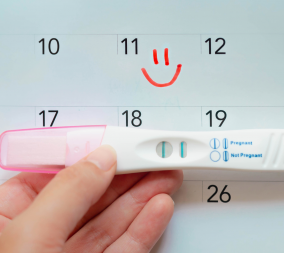Previously written and published in 2012
Being proactive and planning for pregnancy can really work in your favor. Here are 9 important items to consider when you’re thinking about having a baby.
1. Start Prenatal Vitamins
I recommend all women start taking prenatal vitamins well before they start trying to conceive, and certainly once they stop using contraception. You never know how long it will take to get pregnant. So start the prenatal vitamin of your choice today!
Some very important nutrients, particularly folic acid, need to be up to par during the first few weeks of your pregnancy, and even before you get the positive pregnancy test. If you wait until you find out that you’re pregnant, you may miss the window of time where the extra nutrients are the most beneficial.
2. Stop Contraception
In general, there is not a large delay to conception after you stop taking birth control. But the return to normal ovulatory function is not the same for all birth control methods. The exception may be a few months longer delay after stopping Depo-Provera injections (the birth control shot).
3. Quit Smoking
Smoking leads to an increased risk of miscarriage and a variety of pregnancy complications. Pregnancy, if nothing else, should be motivation enough to give up this noxious habit.
4. Get Screening Tests and Vaccines
Have your doctor check your blood work to see if you are immune to rubella. If you are not, get vaccinated. In addition, if you have not received a tetanus vaccine in the last 5 years, I recommend you get one. The new vaccine covers tetanus, diphtheria, and pertussis (whooping cough). By getting vaccinated for whopping cough before having a baby, you can decrease the chances of transmitting this awful disease to your baby when he or she is born.
Also, there are a variety of genetic diseases that can be detected in potential parents prior to conception. Ask your provider what tests, if any, can be performed before you conceive.
5. Manage Chronic Diseases
If you have a chronic disease — including hypertension, diabetes, lupus, asthma, thyroid disease, seizures, or any psychiatric disorders — you should be diligent about achieving optimum control prior to getting pregnant. Be sure to see your primary care doctor or specialists and let them know you are planning to have a baby. They can work with you to ensure you optimal health.
6. Get Pregnancy-Safe Medications
If you take any medications on a daily basis, consult with your provider to ensure they are safe to take during pregnancy. Also be sure to check with your doctor before taking any over-the-counter medicines while trying or after conception.
7. Limit Your Alcohol Intake
Social alcohol intake is considered OK while trying to conceive. But once you find out you are pregnant, I recommend that you avoid all alcohol intake during the course of your pregnancy.
8. Practice Weight Control
If a mother is obese during pregnancy, she runs a higher risk of miscarriage, gestational diabetes, pregnancy-induced hypertension, the need for cesarean delivery, and other adverse outcomes for her baby. There is no better time than now — before or while you’re trying — to start a healthy diet and exercise regimen. If you are markedly obese, I recommend delaying childbearing until you’re able to reach a more healthy weight.
9. Seek Financial Stability
Pregnancy care and delivery are very expensive, even for insured patients. However, this is nothing compared to the cost of raising your child and paying for childcare if needed. You want to be comfortable in your ability to financially care for a child. And if you are not, I recommend taking the necessary steps to achieve that level of comfort before conceiving.


















